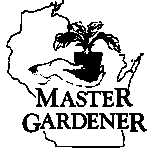
Winnebago County Master Gardener Association
Horticulture Education • Environmental Stewardship • Community Service • Fun!
What is the Master Gardener Program?
History of WCMGA
Becoming a Member
Community Service
Benefits of Membership
Annual Report
History of WCMGA
The Master Gardener program is a service organization. Horticulture training is provided with the expectation that Master Gardeners will share their knowledge to the benefit of their community. The Master Gardener movement originated in the State of Washington in 1972 and has since spread to 48 states including Wisconsin.
The Wisconsin Master Gardener program was created by the University of Wisconsin-Cooperative Extension in response to requests from home gardeners for horticultural information. Associations are formed within counties and work with an advisor who is on the staff of the local UW-Extension office. In 1990, the Winnebago County UW-Extension took steps to form a Master Gardener association in Winnebago County. In 1992, a horticulturist was hired as an advisor to the association and to further develop the program. The association has been thriving ever since. Today, the Winnebago County Agriculture Agent serves as the advisor to the organization.
Becoming a Member
Individuals interested in becoming a certified Master Gardener must initially complete 36 hours of general horticultural training with UW-Extension specialists, faculty and local experts. This training is offered over a 12-week period each year and includes topics such as soils, botany, entomology, plant pathology, houseplants, landscaping, turf, vegetables, fruits and ornamental plants. The cost of the training includes instructional and resource materials that participants keep. See Master Gardener Classes, Seminars and Trips for more information.
When training is completed, the next step is to perform a minimum of 24 hours of volunteer service in the first year to establish certification. To remain certified, each Master Gardener must complete the minimum 24 hours of volunteer service annually on Master Gardener Program Office approved Horticulture Activities. Volunteer hours can also be accumulated through service on the Master Gardener board or committees. Continuing Master Gardeners must also participate in at least 10 hours of continuing education annually. The Winnebago County Master Gardener Education Committee may schedules workshops, seminars and trips throughout the year that count as continuing education hours.
How to Become a Master Gardener
Community Service
Winnebago County Master Gardner horticulture activities or volunteer opportunties are available and listed here on this website and in the Winnebago Master Gardener monthly newsletter. Due to changes initiated by the State Master Gardener Program Office, Master Gardeners are now "horticulture volunteers" for the organization, i.e., The Paine Gardens and Art Center, The Neenah Historical Society, Parkview, etc. The list may change from year-to-year as new Horticulture Activities are proposed approved and listed by the State Program Office. Several of the horticulture activities/volunteer opportunities have been ongoing since the Association was organized.
Master Gardeners may only participate in State Master Gardener Program Office approved Horticulture Activities to accumulate the necessary 24 volunteer hours during each year of service.
Benefits of Membership
By joining the Winnebago County Master Gardener Association, you gain new opportunities for serving your community and learning about horticulture. You will also meet other members who share you passion for gardening and enjoy putting their knowledge to work for the community. The Winnebago County Master Gardener Association has two social meetings per year (typically June and December) and two business meetings per year. The business meetings incorporate an educational component for credit towards the annual education requirement to maintain MG certification. A monthly newsletter is emailed to all members. As a member of the local association, you have the option of joining the Wisconsin Master Gardener Association (WIMGA) and are linked to an even larger network of Master Gardeners throughout the state. You will receive a newsletter that lists gardening events around the state and includes informative articles by UW-Extension specialists and faculty. The Wisconsin Master Gardener Association sponsors meetings and educational workshops.